It’s the middle of winter and you’re starting to feel the effects of the dry air. Your throat is sore, your skin is itchy, and you just can’t seem to get warm. You remember your mother telling you that running a humidifier would help, so you rush out to buy one. But now you’re wondering: can you leave a humidifier on all night? This article will discuss the pros and cons of leaving a humidifier on all night, and provide some tips on how to do it safely!
What do humidifiers do?
Humidifiers are devices that emit water vapor into the air to raise the humidity level. They are often used to relieve dryness of the skin, throat, and sinuses, as well as static electricity. These devices can also help to prevent nosebleeds.
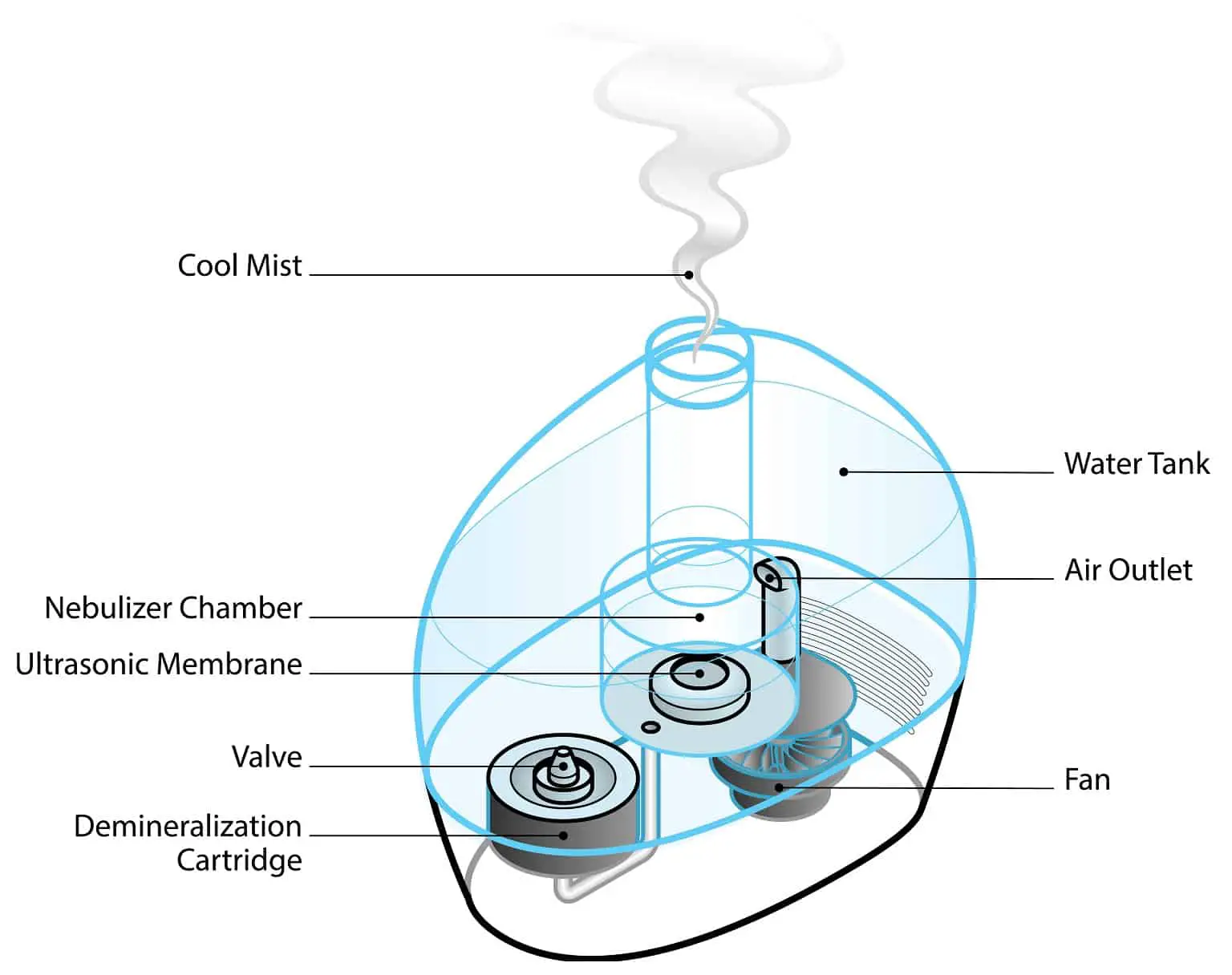
Humidifiers can be used in both residential and commercial settings. In the home, they are often used in bedrooms, living rooms, and basements. They can also be used in office buildings, hospitals, schools, and other public places [1].
Why Avoid High and Low Humidity?
High humidity is great for your skin and hair, but it’s not so great for your home. High humidity can lead to mold and mildew growth, which can damage your walls, ceilings, and furniture. It can also cause health problems like allergies and asthma. High humidity can be caused by several things, including weather, poorly ventilated rooms, and too much moisture in the air.
Low humidity is just as bad. This can be caused by dry weather, heating your home, and using a dehumidifier.
What makes a humidifier safe to run all night?
The answer to this question is two-fold. First, you need to make sure that your humidifier is clean. A clean humidifier will not only be easier on your sinuses and skin, but it will also prevent the growth of mold and bacteria. Moreover, you need to make sure that your humidifier is the right size for the space in which you plan to use it. A humidifier that is too small will not be able to properly humidify the air and may overwork itself, while a humidifier that is too large will waste energy.
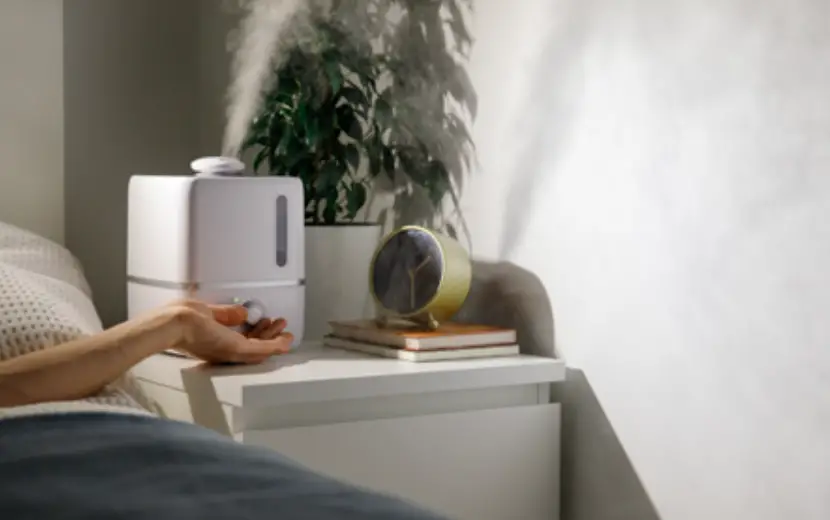
Second, you need to choose a humidifier with an automatic shut-off feature. This way, if the humidity level in your room gets too high, the humidifier will turn off automatically. This is not only safer but will also help to prolong the life of your humidifier [3].
Operational capability
What other factors should you consider when deciding whether to leave your humidifier on all night? One important factor is the operational capability of the humidifier. Many humidifiers are designed for use in a single room and will not be able to properly humidify a large space. If you plan to leave your humidifier running all night, make sure that it is designed for this purpose. Another factor to consider is the noise level of the humidifier. Some humidifiers can be quite loud, which may not be ideal if you are trying to sleep. Choose a quiet humidifier if you plan to leave it running all night.
Portability and automation
Another important factor to consider is the portability of the humidifier. If you plan to move the humidifier from room to room, make sure that it is easy to transport. Some humidifiers are quite large and bulky, which can make them difficult to move. Choose a humidifier that is easy to carry and store. The average weight of a portable humidifier is around 4,4 pounds.
Additionally, many humidifiers now come with built-in automation features. These features allow you to set a schedule for the humidifier so that it turns on and off at specific times. This can be helpful if you want to ensure that your humidifier is only running when you need it.
Reliability
You need to consider the reliability of the humidifier. Some humidifiers are more reliable than others and will last longer without needing to be replaced. Choose a humidifier that comes from a reputable brand and has positive reviews.
Running costs
Finally, you need to consider the running costs of leaving your humidifier on all night. Most humidifiers use electricity to operate, so you will see an increase in your electricity bill if you leave it running all night. However, this increase is typically quite small and is more than offset by the benefits of having a humidifier in your home.
The bottom line is that there are many factors to consider when deciding whether or not to leave your humidifier running all night. If you have a clean, properly sized humidifier with an automatic shut-off feature, there is no reason why you cannot leave it running all night. Just be sure to consider the operational capability and running costs before making your decision.
Runtime
The runtime of the humidifier is another thing you should consider before leaving it on overnight. Most humidifiers have a maximum run time of 12 to 24 hours. If your humidifier has a timer, you can set it to turn off automatically after a certain number of hours.
Benefits of a humidifier while sleeping
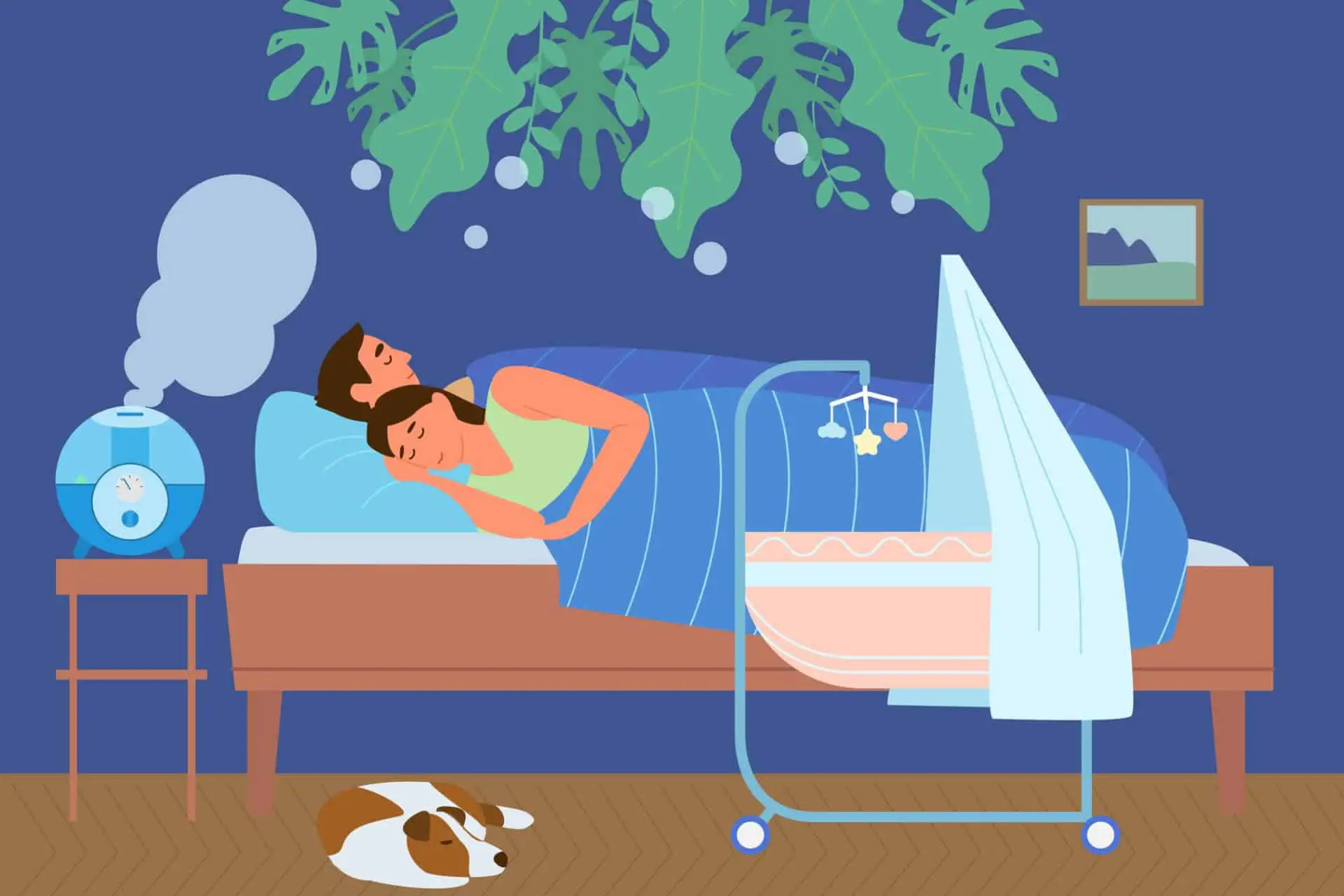
Better sleep
Dry air can cause congestion, nosebleeds, and dry skin – all of which can affect your sleep. A humidifier adds moisture to the air, which can help you breathe easier and sleep more soundly. If your humidifier has a cool mist setting, the added moisture can also help to soothe irritated skin.
Fewer respiratory infections
Dry air can also lead to increased respiratory infections, as it dries out the mucous membranes in your nose and throat, making them more susceptible to bacteria and viruses. By adding moisture to the air, a humidifier can help to keep these membranes hydrated and reduce your risk of getting sick.
Eases congestion and cold symptoms
If you have a cold or allergies, a humidifier can also help to ease congestion by thinning out mucus. This can make it easier to breathe and help you get some relief from your cold symptoms. With such a device, you can also add essential oils to the water, which can provide additional benefits like reducing inflammation or boosting your immune system.
Skin protection
It will not only keep your body hydrated but also your skin. In dry air, there is not enough moisture for the skin to absorb. This can lead to dryness, itchiness, and irritation. A humidifier can help to add moisture to the air and protect your skin from these effects. It can be beneficial for people who suffer from eczema or psoriasis.
Keeping off germs and bacteria
The humidifier will help to keep your home’s air moist. It will make it harder for germs and bacteria to survive and proliferate in your living space. Moreover, the device can also help to reduce the spread of these harmful microorganisms [4].
Risks of a humidifier running at night
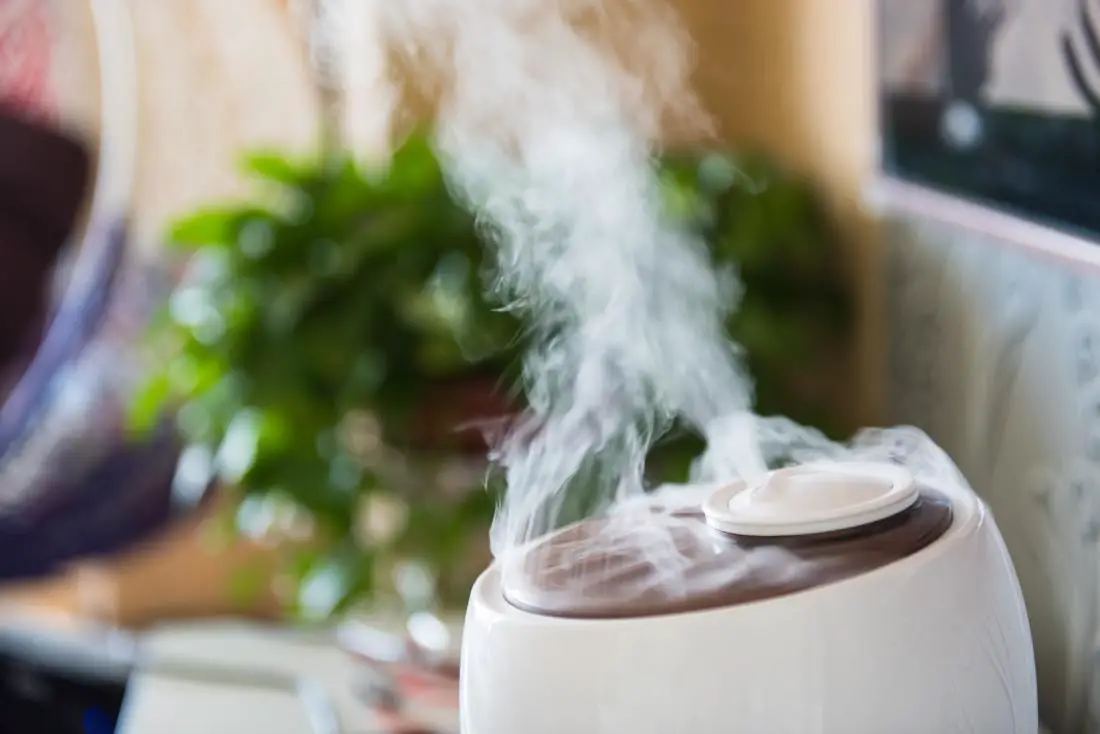
Excess moisture
Too much moisture in the air can lead to mold and mildew growth in your home. This is particularly true if you live in a humid climate or if your humidifier is not properly maintained. Mold and mildew can cause respiratory problems, so it’s important to keep your humidifier clean and properly maintained.
Fire hazard
Another risk of leaving a humidifier running at night is that it could present a fire hazard. If the unit is not properly maintained, the tank could develop cracks or leaks. Water sitting on electrical components could cause a short circuit and potentially start a fire.
Allergies
If you have allergies, you may want to avoid using a humidifier at night. Dust mites thrive in moist environments, so running a humidifier could actually make your allergies worse because it creates an ideal environment for dust mites.
Dry tank
A quickly drying out humidifier tank could also present a safety hazard. If the tank runs dry, the heating element could overheat and start a fire. So, you should be sure to refill the humidifier before going to bed. The average amount of water that can contain a water tank is about six gallons. This amount of water can produce about 12 hours of humidification. That’s why you should only use a humidifier with an automatic shut-off feature if you’re going to be away from home for more than 12 hours.
Condensation on windows
Another potential problem with running a humidifier at night is that it can contribute to condensation on your windows. This is especially true if you have single-pane windows. The excess moisture in the air can cause water to collect on the cold surface of the window glass. Over time, this water can damage the window frame and sill.
How to use the humidifiers at night safely?
It is generally safe to leave a humidifier running overnight. However, there are some important precautions that you need to take to make sure that your humidifier is used safely. First, you need to make sure that the humidifier is placed on a level surface. This will help to prevent the unit from tipping over and spilling water. Second, you need to make sure that the humidifier is filled with clean water. If the water is not clean, it can lead to bacteria and mold growth in the unit. Additionally, be sure that your device has a timer to adjust the amount of time the humidifier is turned on.
Third, you should keep the humidifier away from any open flames. This includes candles, fireplaces, and stoves. The heat from these sources can cause the water in the humidifier to boil, which can create a risk of burning or scalding. Finally, you should place the humidifier out of reach of children and pets. This will help to prevent them from accidentally tipping the unit over or getting their hands on the hot water inside.
How to clean the humidifier?
If you’re using a humidifier, it’s important to clean it regularly. Depending on the type of humidifier you have, this may mean once a week or once a month. Most manufacturers will have specific instructions on how often to clean your humidifier. Such instructions include some tips on what to use to clean the humidifier.
If you don’t clean your humidifier, it can become a breeding ground for bacteria and mold. These can then be released into the air, which can cause respiratory problems. To clean your humidifier, you’ll need to:
- Unplug the humidifier.
- Remove the water tank.
- Clean all of the parts with warm, soapy water.
- Rinse everything well and allow it to air dry.
- Fill the water tank with fresh, clean water.
Be sure to read the manuals that came with your humidifier for specific cleaning instructions [5].
Comparison of Leaving a Humidifier On All Night
Leaving a humidifier on all night can provide several benefits, but it’s important to consider various factors. Below is a comparison of the pros and cons of running a humidifier throughout the night to help you make an informed decision.
| Aspect | Leaving Humidifier On All Night | Advantages | Considerations |
|---|---|---|---|
| Improved Sleep | Running a humidifier overnight can create a comfortable sleep environment by preventing dryness and congestion. | Enhances sleep quality, minimizes snoring, and alleviates discomfort for better rest. | Requires proper humidity control to avoid over-humidification, which can lead to issues like mold growth. |
| Respiratory Health | Continuous humidification can help maintain optimal indoor humidity levels, reducing the risk of respiratory problems. | Alleviates dry throat, nasal irritation, and respiratory issues caused by low humidity, promoting healthier airways. | Regular monitoring and cleaning are necessary to prevent mold or bacterial growth in the humidifier or excessive humidity levels. |
| Skin Hydration | Consistent humidification throughout the night can prevent dry, itchy skin and maintain skin hydration. | Improves skin comfort and appearance, particularly during dry seasons or in arid climates. | Requires regular cleaning and maintenance to prevent bacterial growth or mineral buildup in the unit or on your skin. |
| Air Quality | Proper humidity levels help reduce static electricity, dust, and allergen particles in the air, improving air quality. | Enhances indoor air quality and minimizes airborne particles, making it more comfortable and healthy. | Over-humidification can cause problems like condensation, which may damage furniture or promote mold growth. |
| Energy Consumption | Continuous use may increase energy consumption and impact utility costs. | Provides comfort and health benefits, but it’s important to consider the effect on your energy bills. | Using energy-efficient models and setting humidity levels appropriately can help mitigate increased energy costs. |
Explanation of the table:
- The table provides a comparison of the advantages and considerations of leaving a humidifier on all night, addressing aspects such as improved sleep, respiratory health, skin hydration, air quality, and energy consumption.
- Each aspect is described, highlighting the benefits and potential issues associated with running a humidifier throughout the night.
FAQ
Can you leave a humidifier on all night for your baby?
It’s generally safe to leave a humidifier running overnight, as long as you take a few precautions. First, make sure the humidifier can’t be tipped over. Second, keep the humidifier clean to prevent the growth of mold and bacteria. Third, use distilled water rather than tap water to fill the humidifier.
How long should you run a humidifier at night?
Most humidifiers will automatically turn off when the water level gets low. However, you may need to run the humidifier for a longer period if the room is very dry. The average time needed to raise the humidity level in a room is about 3 hours.
Do humidifiers kill viruses?
Humidifiers alone will not kill viruses. However, using a humidifier can help to reduce the spread of viruses by keeping the air moist. This can prevent the virus from drying out and becoming airborne. In addition, using a humidifier can help to relieve congestion and cold symptoms.
How can I prevent my humidifier from tipping over?
There are a few things you can do to prevent your humidifier from tipping over. First, make sure the humidifier is stable on its base. Second, use a cord wrap to keep the power cord tidy and out of the way. Third, consider using a weight-based humidifier stand.
Does a humidifier help with a cough?
Yes, a humidifier can help to relieve coughing by keeping the air moist. This is especially helpful for dry coughs. In addition, using a humidifier can help to reduce congestion and cold symptoms.
Is it safe to run a humidifier continuously throughout the night?
Yes, it is generally safe to leave a humidifier running all night. Running a humidifier overnight can help maintain optimal humidity levels in the room and provide consistent relief from dry air, especially during the winter months.
Are there any potential risks or drawbacks to leaving a humidifier on during the night?
While leaving a humidifier on all night is safe for most people, some potential drawbacks include over-humidification, which can lead to excess moisture in the room, or a need for more frequent refilling of the water tank. It’s important to monitor humidity levels and follow the humidifier’s instructions to avoid these issues.
Should I use a timer or a humidistat to control the humidifier’s runtime during the night?
Using a timer or a humidistat can be beneficial to control the humidifier’s runtime during the night. A timer allows you to set a specific duration, while a humidistat measures humidity levels and operates the humidifier as needed to maintain the desired humidity.
Can running a humidifier all night help with sleep and respiratory issues?
Running a humidifier all night can help improve sleep quality and alleviate respiratory issues. Maintaining optimal indoor humidity levels can ease congestion, prevent dryness in the throat, and provide a more comfortable sleeping environment.
Is it safe to leave a warm mist humidifier on overnight, or is it better to use a cool mist humidifier?
Both warm mist and cool mist humidifiers can be left on overnight. The choice between them depends on personal preference and specific needs. Warm mist humidifiers may be more comforting in cooler climates, while cool mist humidifiers are safer around children and pets due to the absence of hot water.
Useful Video: Is it OK to have a humidifier on all night?
Conclusion
The humidifier can help to solve different problems that are faced by people. However, it is important to use the humidifier in the right way to get the maximum benefit from it. There are different types of humidifiers available in the market and one should choose the type that is best suited for their needs. Humidifiers can be used for different purposes such as reducing static electricity, and alleviating dry skin, and sinus problems. To get the maximum benefit from a humidifier, you can use this device during the night but you should follow some tips to get the optimum results and avoid any health hazards.
References
- https://www.mayoclinic.org/diseases-conditions/common-cold/in-depth/humidifiers/
- https://www.airthings.com/resources/home-humidity-damage
- https://bestcheaphumidifier.com/should-humidifier-run-all-night-while-youre-sleeping/
- https://www.medicinenet.com/is_it_good_to_sleep_with_a_humidifier/article.htm
- https://www.hgtv.com/lifestyle/clean-and-organize/how-to-clean-a-humidifier





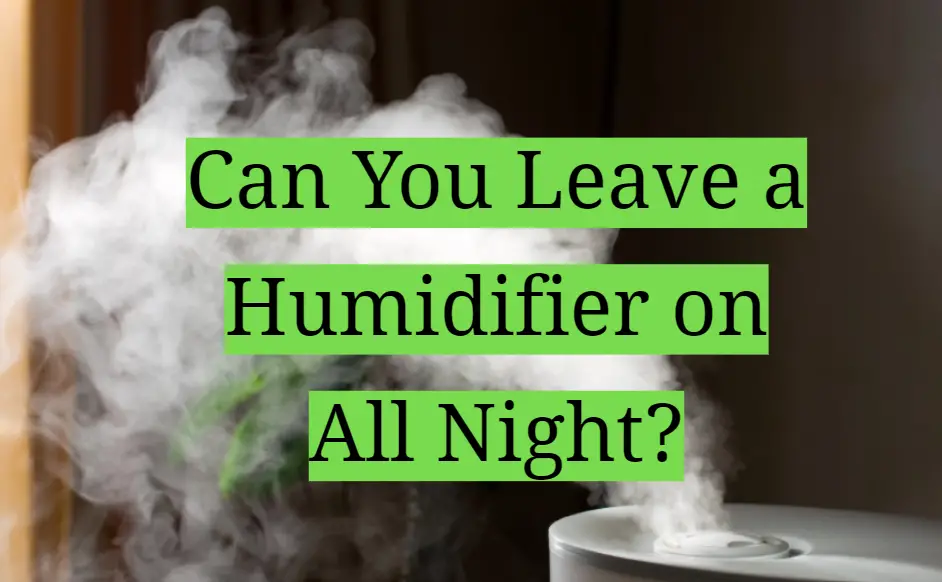
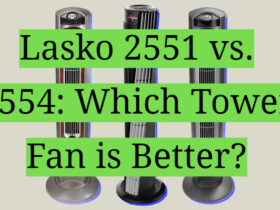



Leave a Reply